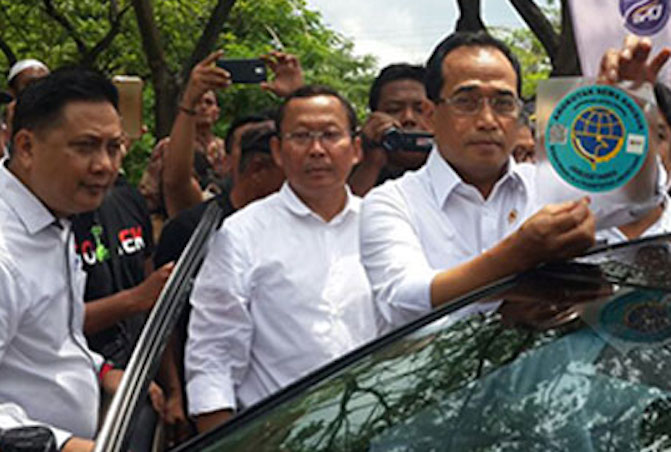After Indonesia’ Supreme Court lifted the government’s regulatory constraints on ride sharing apps such as Uber, Grab, and Go-Jek in August last year, thus giving the locally-termed “online taxis” a virtually free market to operate in Indonesia, the government issued a new set of revised regulations in the Transportation Ministry Regulation no. 108/2017 (Permenhub 108/2017) in October, which is due to be put into full effect on February 1.
Permenhub 108/2017 is slightly different to previous regulations in that its purpose is more about protecting customers’ safety and interests than to regulate pricing (there is still some fare regulation — more on that later). Among the requirements online taxis (specifically cars, in this case) must adhere to by February 1 include sticking special stickers — measuring 15cm in diameter — issued by the Transportation Ministry in order to signify their status as public transportation vehicles. In addition, the regulations also require drivers to own a license, and that their cars must pass the government’s road-worthiness test.
The previous regulation on pricing, which forced online taxis to charge the same as regular taxis, was replaced with a regulation allowing ride-sharing providers and drivers to decide their own fares, as long as it falls around the minimum and maximum limits set by each regional government. Permenhub 108/2017 also allows regional governments to set a limit on how many online taxis can operate in their area.
With Permenhub 108/2017 coming into full effect in a matter of days, online taxi drivers across the country have been holding protests against the regulations, with one expected to take place in the capital Jakarta next Monday.
While the number of protesters has not been estimated, the police say they are going to deploy 400 personnel to secure the demonstration, which is expected to take place in front of the Transportation Ministry office and the Presidential Palace, both of which are in Central Jakarta.
Transport Minister Budi Karya Sumadi said he regrets that there has to be a protest, as he considers Permenhub 108/2017 fairer than previous regulations.
“We are a country with laws, so why don’t they want to be regulated? Why don’t the online taxi drivers want to be given signs (online taxi stickers)? What about [passenger’s] safety if we don’t give [online taxis] signs?” he said, as quoted by Detik yesterday.
“How come drivers don’t want [their cars] to take the road-worthiness test? Don’t they think they should hold a SIM A license (for car drivers)? These [regulations] are all for the customers, not the drivers.
The Association of Online Drivers (ADO), the biggest online taxi drivers union in Indonesia, previously criticized some of the points in Permenhub 108/2017, such as the sticker requirement, saying many of their cars are also used privately when unplugged from the apps. However, the association is now on board with Permenhub 108/2017and is not going to support Monday’s protest, thought they are asking the government to hold off on its enforcement for some time to allow drivers to adhere to the regulations.




